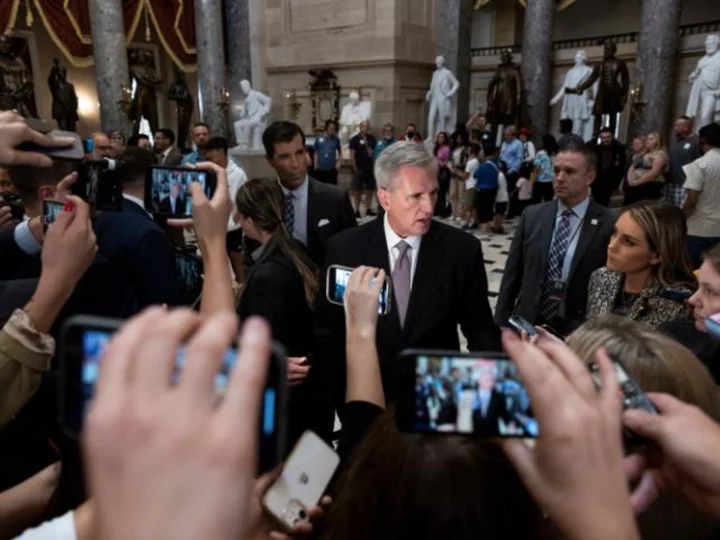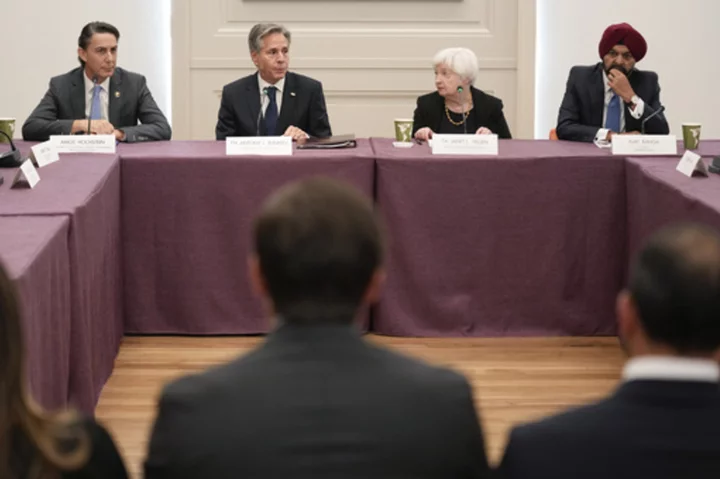Lawmakers and aides arrived for work on Wednesday to find a House of Representatives stuck in freeze-frame, a giant blue screen declaring them "in recess" almost the entire day.
The House calendar remained officially stuck on October 3 -- Tuesday -- the date when House Speaker Kevin McCarthy was ousted and left the chamber without adjourning.
The interim speaker eventually managed to adjourn the chamber at 3:25 p.m. on Wednesday, but the day of inaction still spoke volumes.
"The House of Representatives is effectively frozen," Rep. Garret Graves, a Louisiana Republican, told reporters. "We are not able to actually advance legislation. We can't even refer bills to committees."
Without an elected speaker, the House is struggling to figure out what it actually can do these days. As speaker pro tempore, Republican Rep. Patrick McHenry of North Carolina can perform tasks like recessing the House, adjourning the chamber and recognizing speaker nominations, according to the House Practices Guide. The situation is unprecedented, though, and many are still working to understand the exact limitations of the role.
Also up for debate is how forcefully House Republicans might continue their impeachment inquiry of President Joe Biden, without an elected speaker to back up the subpoenas they want to issue. Aides speculated that committees could technically continue to pursue business with a legislative purpose, but there is no real precedent that applies.
Given the state of chaos, Graves said, the White House might not have any incentive to cooperate with their subpoenas.
"You don't actually have an organized House right now," Graves said. "And if I were the White House in this situation, all day long, I would completely ignore it and say, 'You don't have the enforcement authority.'"
Despite the serious roadblocks, the House Oversight and Judiciary committees plan to keep plowing ahead with their investigations, committee aides and one key member told CNN.
"We're going to continue to read emails, text messages, put together timelines, try to get people to come in," House Oversight chair James Comer of Kentucky told CNN. "We're going to keep working like we've been working. And continue to follow the money."
But the pressure is ramping up to do more. Government funding is set to expire on November 17 and the parties are nowhere near an agreement on spending. Members and aides alike question how they'll avert a government shutdown when there is so much uncertainty about the basic rules of House operation.
Amid the confusion, many committee meetings got canceled for the remainder of the week. Some members huddled in their offices, trying to figure out what comes next, while others booked last-minute flights out of town.
There was a contentious office shuffle, too. The sign bearing McCarthy's name hadn't even been removed from the speaker's office when CNN learned that he was the one behind booting two Democrats from their choice spaces on his way out the door.
And there was intra-party tension among Republicans, in part because of the timing of McCarthy's ejection. Eight members of McCarthy's party initiated his ouster on a day when the House had been planning to address government funding bills.
"Now we have to spend time, you know, deciding what we're going to do," House Foreign Affairs chairman Michael McCaul, a Texas Republican, told CNN. "What's the next step? Who is the next speaker going to be? And in the meantime, we lose all the floor time to get the appropriations bills passed."
For now, some members favor holding off on anything big.
"Until we figure out how we have another speaker of the House, everything stops," Rep. Kelly Armstrong, a North Dakota Republican on the House Oversight Committee, told CNN.
Others admit befuddlement.
"Nobody knows what's going to happen next," House Rules Chairman Tom Cole of Oklahoma said.
A key looming question is how long this state of paralysis could last.
While House Republicans intend to hold a candidate forum for would-be speakers on Tuesday, it could take time for Republicans to unify behind a single one.
House Judiciary Chairman Jim Jordan of Ohio and House Majority Leader Steve Scalise of Louisiana have announced they are running for the top job, but it is still unclear who can get the 218 votes needed to win the gavel.
"Look," said Graves, "there are scenarios where this could be going on for weeks."









